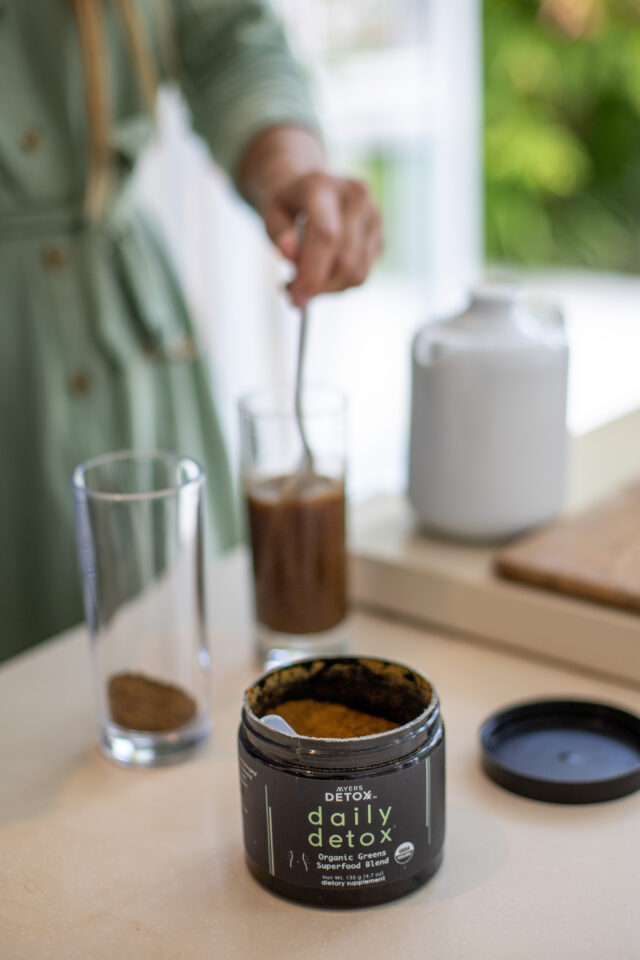Stress may be a fact of life, but it doesn’t have to determine the quality of your life.
Unfortunately, for many of us, the impacts of low-level chronic stress slowly wear away at our well-being and seep into other areas of our lives, while impacting our bodies in a myriad of ways.
The good news, however, is that Mother Nature provided us with a handful of potent herbs and nutrients that can help our bodies combat the impacts of stress and gently guide us back into balance.
Read on to discover the top 11 foods to lower cortisol and restore hormone balance.
In this article, you’ll learn:
- The detrimental impacts that cortisol has on your brain
- How stress can worsen symptoms of menopause, and even cause early onset
- Cortisol’s role in accelerating aging
- The simple, stress-busting, daily habit that will balance out your stress response so you can feel your best.
The Impacts Of Dysregulated Cortisol
It’s not just your mind and emotional state that’s affected by stress. When you have cortisol pumping through your veins, your body can also take a significant hit. Let’s explore three of the most powerful ways that chronic stress can throw you off physiologically.
Sex Hormone Balance
Your entire hormonal system is a delicate dance between different compounds, each impacting the other in different ways. It should be no surprise, then, that high levels of cortisol can have a significant effect on sex hormones.
While both men and women at any age can experience the ups and downs of hormonal balance, cortisol can really do a number on women of menopausal age.
First, cortisol can impact progesterone levels as both of these hormones share the same precursor: pregnenolone. When stress is high, more pregnenolone is converted to cortisol, leaving your body with a progesterone deficiency[1].
The balance of progesterone and estrogen is crucial for female hormonal health, but it becomes even more vital during perimenopause when progesterone levels naturally start to drop. Add stress to the mix and you’ll end up with symptoms of low progesterone, like headaches, mood changes, hot flashes, difficulty sleeping, and weight gain[2].
But progesterone isn’t the only hormone cortisol impacts—estrogen levels can also take a hit. Interestingly, high cortisol may either decrease estrogen or cause estrogen dominance, which makes matters even more complex. If cortisol is lowering progesterone, it can leave you with estrogen dominance. However, high cortisol may also interfere with a woman’s ovulatory cycle and, as a result, impact your ability to produce estrogen, leaving you deficient[3].
Either way, high cortisol spells big trouble during menopause and perimenopause when a woman’s hormones are already fluctuating significantly. Issues like hot flashes, weight gain, sleep issues, and depression can all worsen when cortisol enters the mix. And even more devastating, some research suggests that high-stress levels can cause early-onset menopause in some women[4][5].
Brain Health
Another serious issue to consider is the impact that stress can have on your brain.
Studies show that high levels of cortisol are linked to increased risks for dementia and Alzheimer’s disease. Generally speaking, stress appears to affect our executive functioning and overall cognitive abilities[6].
Although we don’t know the exact mechanisms by which cortisol instigates these changes, some research shows that high cortisol levels may cause structural changes in the brain. Specifically, cortisol may cause decreased volume in the hippocampus and frontal lobe[7][8].
Your hippocampus plays a role in memory, learning, and emotion, while your frontal lobe is the center of executive function, language, social interactions, and physical movement[9][10].
Aging
Cortisol can significantly impact the aging process as stress will influence almost every system of your body. Everything from sleep to immunity to hormonal health (as you’ve learned) can take a hit, all of which come together to set the stage for accelerated cellular aging[11].
And then, of course, we have oxidative stress. As cortisol levels go up, so too do your levels of reactive oxygen species, which directly impact the function of your mitochondria (the powerhouse of your cells). Without getting too in the weeds, just know this: poor mitochondrial health is a recipe for accelerated aging[12].
That said, two areas where you may begin to see the effects of stress most clearly are your skin and hair.
We’ve all been there; you’re taking a shower, washing your hair, and bam—a whole chunk of hair rinses down the drain. High stress can cause hair loss, and when it happens, it can be quite shocking. How and why does this happen?
High levels of cortisol literally tell hair follicles to take a rest, preventing them from continuing the cycle of hair regeneration[13].
Moreover, since your sex hormones also play a role in hair growth, high cortisol may impact hair loss via hormonal dysregulation of estrogen and progesterone.
As for your skin, high stress levels directly influence the integrity of several structures in your skin, including the collagen that lays the foundation for your extracellular matrix (ECM). High cortisol breaks down collagen, leaving the scaffolding that’s supposed to keep your skin tight, weak and weary. This leads to those unwanted fine lines and wrinkles you see when you look in the mirror[14].
The oxidative stress that results from high cortisol may also instigate inflammation, which can increase the production of the enzyme hyaluronidase. Hyaluronidase breaks down hyaluronic acid, the skin molecule responsible for retaining moisture. Without enough HA your skin becomes dry, dull, and loses its elasticity[15].
11 Natural Plants That Help Balance Stress
Okay, enough with the bad news. Now that you know what stress can do to your body, let’s talk about a few precious gifts from Mother Nature that can help bring your cortisol back into balance—even if life isn’t quite perfect.
#1. Reishi
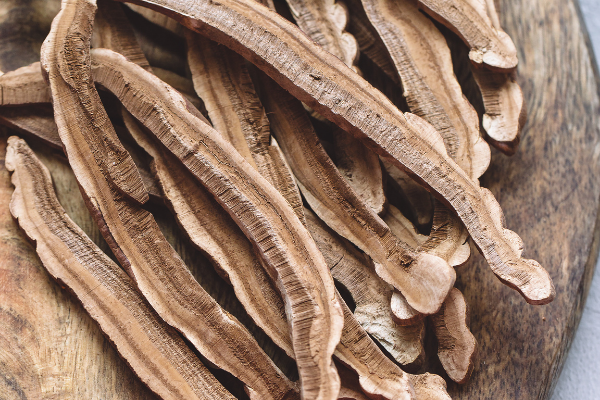
Reishi is a medicinal mushroom well-known for its immune-boosting properties, but it’s also considered an adaptogenic mushroom as it supports your body’s defense against stressors.
In an animal study, researchers found that reishi reduced stress-induced inflammation in the brain, helping to protect against nerve damage. Reishi also helped to improve neuroplasticity in the brain (the brain’s ability to change and heal), protected against memory impairments, and regulated neurotransmitters[16].
Other research shows that reishi may offer anti-depressant and anti-anxiety-like effects when stress is high[17].
#2. Moringa
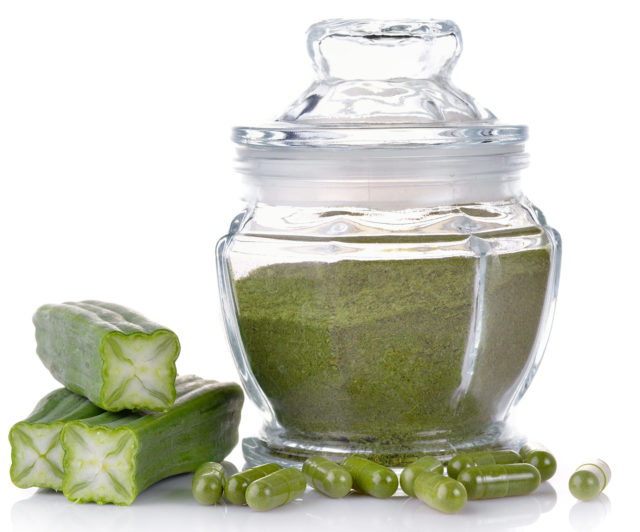
Moringa is a medicinal plant that’s been used in Ayurvedic medicine for thousands of years. This plant is rich in a number of nutrients but is a particularly good source of vitamin C—a potent antioxidant.
Research shows that moringa displays adaptogenic activity by working on the adrenocortical system, which is responsible for releasing stress hormones such as cortisol[18].
Furthermore, moringa is a rich source of isothiocyanates, a phytochemical with anti-inflammatory activity. Stress and inflammation often go hand-in-hand, giving moringa yet another edge against the unwanted side effects of chronic stress[19].
#3. Cordyceps
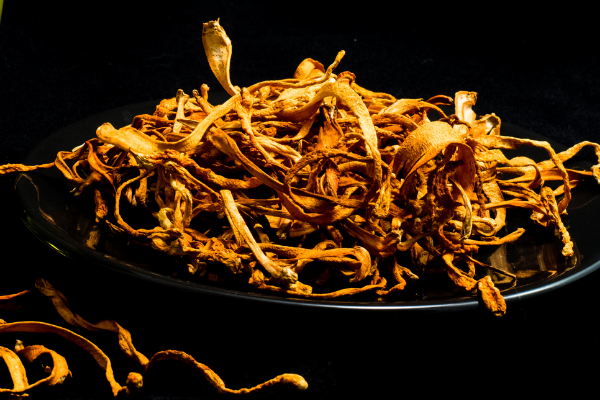
Cordyceps is another medicinal mushroom that boasts stress-reducing qualities. While reishi is known for its immune enhancement, cordyceps is a go-to for combating the fatigue that comes with mental and physical stress[20].
Cordyceps’ ability to help you bounce back in the face of stress is likely, at least in part, due to the compound cordycepin. Cordycepin is the primary active compound in cordyceps and it’s a powerhouse nutrient with studies showing anti-inflammatory, antioxidant, immunomodulatory, anti-viral, and hepatoprotective activity[21].
#4. Pomegranate
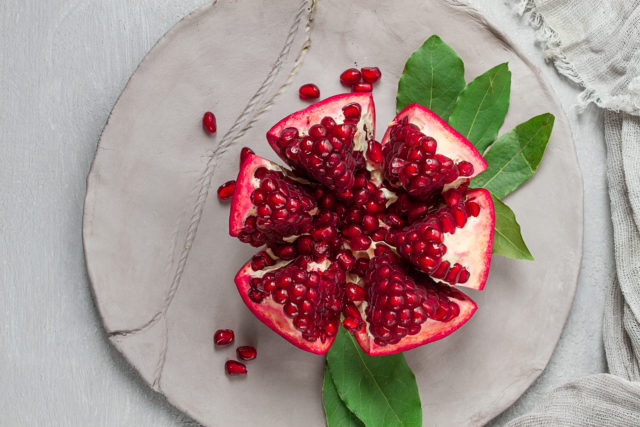
You may be surprised to see pomegranate on this list, but this fruit is a powerhouse of antioxidants and research shows it can go head-to-head with cortisol.
Specifically, studies show that the biophenols (antioxidants) found in pomegranates may lower salivary and serum cortisol levels while improving overall quality of life scores. This research has been conducted on both healthy volunteers as well as those with chronic health conditions[22][23].
Other research shows that pomegranate extract may also help to reduce blood pressure and support heart health due, in part, to its effect on stress and cortisol levels[24].
Pomegranates are also a woman’s best friend when it comes to balancing estrogen. In their own unique way, pomegranates act like an adaptogen for female sex hormones due to their phytoestrogen content. When estrogen levels are low, phytoestrogens can help to increase receptor activity. Conversely, when estrogen levels are high, phytoestrogens can help to block receptor activity.
In menopausal women, pomegranate has been shown to significantly improve symptoms of menopause including hair loss, fatigue, and hot flashes—in just four weeks[25].
#5. Shiitake
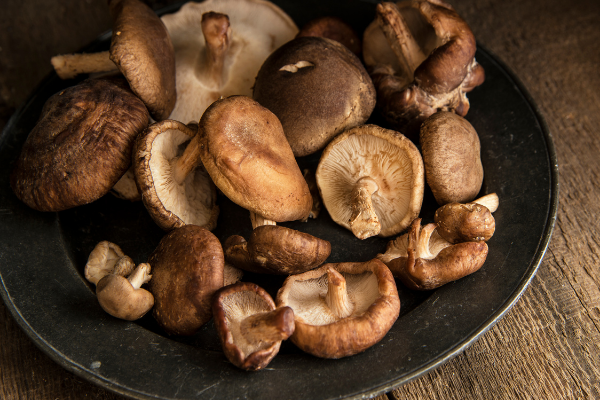
Shiitake is a medicinal mushroom that’s been researched for its immune-enhancing properties. Interestingly, studies show that shiitake may owe its immunomodulatory functions to its stress-reducing activity.
Specifically, research shows that shiitake may influence the concentration of stress hormones (such as cortisol) and catecholamines (including epinephrine, norepinephrine, and dopamine), reducing the host’s susceptibility to infection. In other words, shiitake protects you from stress, allowing your body to better fight unwanted invaders like bacteria and viruses[26].
#6 Green Tea
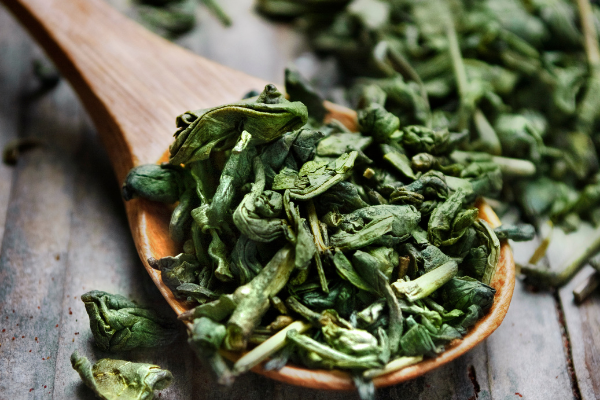
Have you ever noticed that green tea doesn’t give you the jitters like coffee? That’s due to the amino acid l-theanine, which naturally occurs in green tea leaves.
Research shows that l-theanine can help to relieve stress and anxiety in people who are feeling overwhelmed[27]. Interestingly, it appears that l-theanine can directly combat the anxiety-reducing effects of caffeine, which is also naturally occurring in green tea.
Studies suggest that theanine works its magic by interacting with the glutamate transporter in your brain. Glutamate is an excitatory neurotransmitter that can increase feelings of anxiety. By lowering the amount of glutamate in your brain, theanine helps to shut down some of this excitatory activity, thus relieving anxiety[28].
#7 Milk Thistle
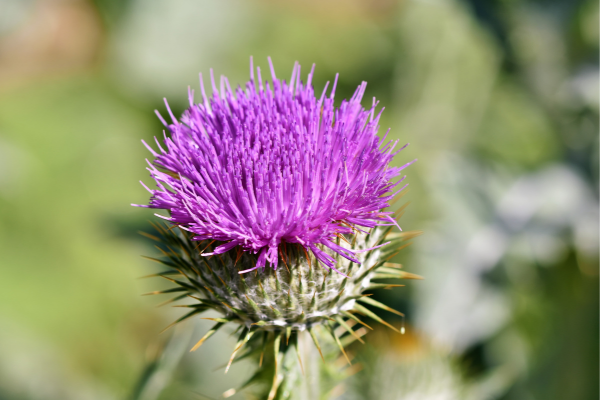
Milk thistle is famous for its liver-supportive activity, but this medicinal herb is also excellent for helping to manage stress.
The flavonoid silymarin, the primary active component of milk thistle, has been studied for its anti-stress activity. Research shows that in addition to its anti-inflammatory effects, silymarin can also help to modulate neurotransmitters, potentially increasing serotonin production. Low serotonin is associated with symptoms of anxiety, so this may be the mechanism by which milk thistle helps with stress and anxiety[29].
#8 Turmeric
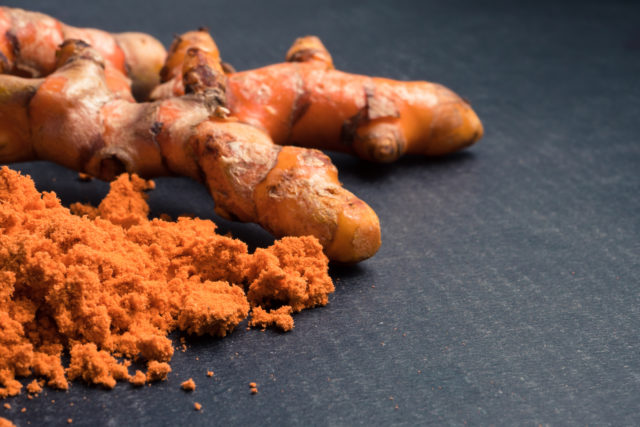
Turmeric is a spice that’s been used for thousands of years in ancient systems of medicine like Ayurveda for its many healing properties.
While it’s most well-known as a powerful anti-inflammatory plant due to the active compound curcumin, turmeric also possesses anti-depressant and anti-stress activities, with research showing that it can promote resilience in the face of tough situations[30].
Due to the powerful anti-inflammatory activity of curcumin, turmeric exhibits neuroprotective properties that may help calm inflammation in the brain. Among the many contributors to stress and anxiety, neuroinflammation is thought to be of primary importance, which may be the reason that turmeric (and curcumin) can calm mental and emotional stress[31].
#9 Broccoli Sprouts
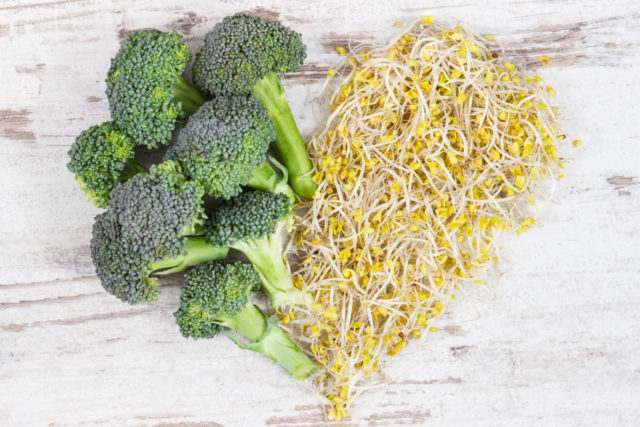
Broccoli sprouts are rich in sulforaphane (SFN), a powerful phytochemical that exhibits antioxidant and anti-inflammatory properties. Animal research shows that SFN may directly impact neurological health, and thereby promote states of well-being, specifically helping to calm anxiety and life depression.
In addition to the anti-inflammatory effects of SFN, some research suggests that this compound may work directly on the HPA (hypothalamus-pituitary-adrenal) axis, inhibiting overactivity. The HPA axis is responsible for your stress response, and when dysregulated can cause increased release of stress-producing chemicals like cortisol. By reducing the HPA axis’s activity in stressful situations, SFN may help regulate the overall stress response[32].
#10 Chlorella
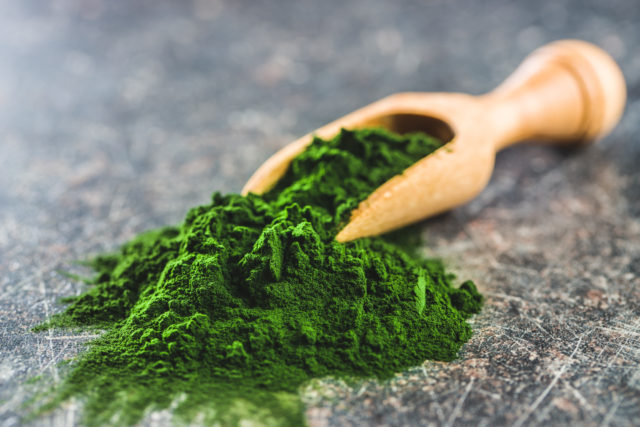
Chlorella is a nutritional powerhouse, rich in vitamins, minerals, and phytonutrients.
Interestingly, this type of algae has also been studied for its impact on the HPA axis. Research shows that much like broccoli sprouts, chlorella may help to inhibit overactivity of the HPA axis, and therefore reduce the amount of stress hormones released in the face of a challenging situation[33].
As a source of omega-3 fats, chlorella may exert some of its anti-stress activity by helping to modulate the fat composition of your brain. Omega-3 fats are known to improve memory, learning, and overall cognitive well-being[34].
#11. Kelp

One of the unfortunate side effects of psychological stress is an increase in oxidative stress in your body. Research shows that as we undergo more emotional turmoil and pressure, our body responds with increased levels of reactive oxygen species (ROS)[35].
Maintaining a balance between your oxidative stress and antioxidant inputs is crucial for the homeostasis of your mind and body, which means that when you’re under any type of stress (acute or chronic), ensuring that your ability to fight off oxidation is critical.
Kelp, and other forms of seaweed, are naturally nutrient-rich, and contain a plethora of antioxidants that can help sure-up your body’s immune response when you’re faced with stressors[36].
The Ultimate Stress-Busting Daily Habit
If you’re hoping to age gracefully, reducing your stress levels, particularly your cortisol levels, is crucial. That said, stress reduction can be a whole lot easier said than done.
Even if you participate in weekly (or even daily) yoga classes, do your mindfulness meditations, ensure you’re getting to bed early, and eat a nutrient-rich diet— you could still find yourself wrapped up in the daily grind.
That’s why I like to focus on the easiest, low-hanging fruit option for stress reduction. It’s a simple daily habit that takes fewer than 30 seconds, and it’s called Daily Detox.
Daily Detox is my all-in-one detox and stress management supplement that contains all twelve stress-busting superfoods mentioned in this article (along with nutrients to support detox, anti-aging, gut health, immunity, and more).
Making Daily Detox a part of your morning routine provides your body with a powerhouse of nutrients to combat high stress levels and balance cortisol. Stress is, unfortunately, inevitable. But the detrimental effect that stress has on your body doesn’t have to be.
Takeaway
Stress is a natural part of life; in fact, some stress can even benefit the body. Today, however, most of us aren’t dealing with some stress; we’re dealing with a lot of stress. And with stress comes high cortisol levels, and with high cortisol comes a slew of issues, some of which we covered in this article.
Using tools like Daily Detox can help you get a leg up on the stress that comes your way. This doesn’t mean you can ignore your dietary needs or skip helpful practices like breathwork, yoga, or meditation. Rather, utilizing Daily Detox will give you the edge you need to combat excess stress, which will likely make you more motivated to participate in other stress-reduction activities as well.



